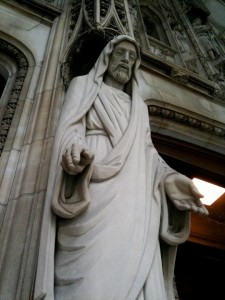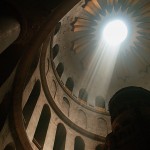In Jesus Christ, God is not an abstraction, concept, or idea but a Person. The Unknowable is made known. The Invisible is made material. All mysticism is now grounded, and all agnosticism now countered, in this particular Person; there is now, paradoxically, a Measure within Measurelessness.
“For in Christ lives all the fullness of God in a human body.” (Col. 2:9) “For God in all his fullness was pleased to live in Christ.” (Col. 1:19) Conversely, whatever is not revealed in Jesus is not the Triune God.
Contemporary Christians (of all sorts of persuasions) tend to de-couple God from Jesus.
Traditionalists and progressives alike construct complicated (often confusing) systems of conceptual theology which collapse when confronted with the reality of Jesus, God enfleshed; the reality of Jesus, the crucified God; the reality of Jesus, the resurrected, ascended, yet-flesh-bearing–inescapably material–Lord of the finite and infinite.
Jesus makes it hard to claim that we don’t really know who God is and can’t really say much for certain about him, which is the temptation of many progressives.
He also makes it hard to press Classical Greek (pagan) attributes for the divine that no longer make entire sense when we encounter God’s arrival in time, space, and matter, which is the temptation of many traditionalists.
We can say a great deal about God because of Jesus Christ. We can also rule out a lot about God because of Jesus Christ.
Many skeptics and cynics are actually opposing not Jesus but the systematic God of the ancient philosophers or the soft “Otherness” God (who can be whatever we want God to be). Christians worship neither of these gods.
We follow the flesh-and-blood manifestation of the Creator we have in Jesus Christ, revealed in the New Testament and in the worship of the Church as the Lamb of God, slain from the foundation of the world for the sins of the whole world.
Jesus hanging as a curse on a tree is the exact image of Israel’s unseen אֶהְיֶה אֲשֶׁר אֶהְיֶה “I Am That I Am.”
With Lesslie Newbigin, we recall the note found sewn into the lining of Pascal’s coat: “Not the god of the philosophers, but the God of Abraham, Isaac and Jacob.”
If we have seen Jesus, we have seen the Father. Jesus and the Father are One.
The defenders of the classical idea of God don’t like the vulnerability of Jesus. His handling of sinners, his descent to the dead, his exposure to our fallen nature are not suitable to his divine origin. How can God bleed, dine with–touch?–the unclean, cloth himself in sin-tainted flesh (without sin), fellowship with the dead, love the Samaritan?
The particularity of Jesus is resisted by those who desire a malleable, unknowable God: Jesus is a Jew; he’s a first century male living in what the Romans came to call Palestine; he was formed by the Torah and the Psalter; it was his weekly custom to worship in a synagogue. He transcends these specifics but he cannot then or now be divorced from them.
He bows neither to our identity politics nor our xenophobia. His divinity does not require the metaphysical safety nets of classical Greek theology and all the specificity of Jesus enhances–never diminishes–his transcendence.
He claims not merely to be a good man–a sage of exemplary human living–he claims to be God, something a rational man cannot and should not claim and still be considered trustworthy or wise.
It is not a dead man that inspires Christian worship, but a living one; one whose DNA can yet in glory be traced to Mary and David, who is at the same time the only begotten Son of the Father. All of this–this new humanity he introduces and this unchanging divinity–is made available to us by the Spirit in the Eucharist.
Mystics and intellectuals alike are all at once restrained and set free by the beauty of Jesus Christ.
Jesus is the one who makes the demons tremble, who delivers us from death, who restores our membership in the divine family—not the god of the philosophers, sages, skeptics, cynics, and gurus—but this vulnerable, knowable God.
We do not know all there is to know about this One and his vulnerability is inextricably bound to an incalculable strength; yet to see Jesus is to see the Father. Here in the realm of uncertainty and predictability this much is seen and this much is enough.













